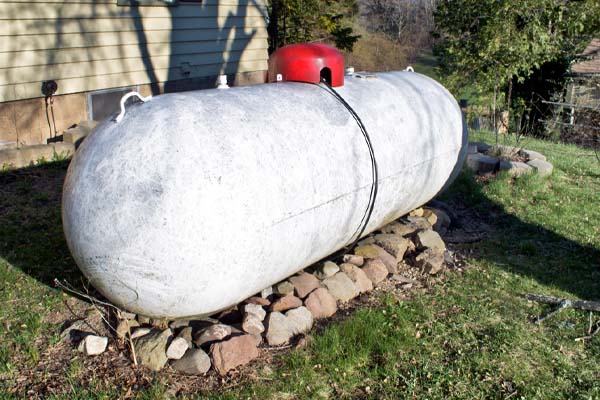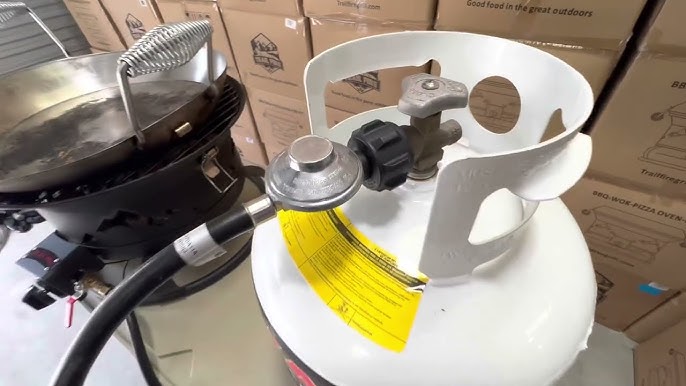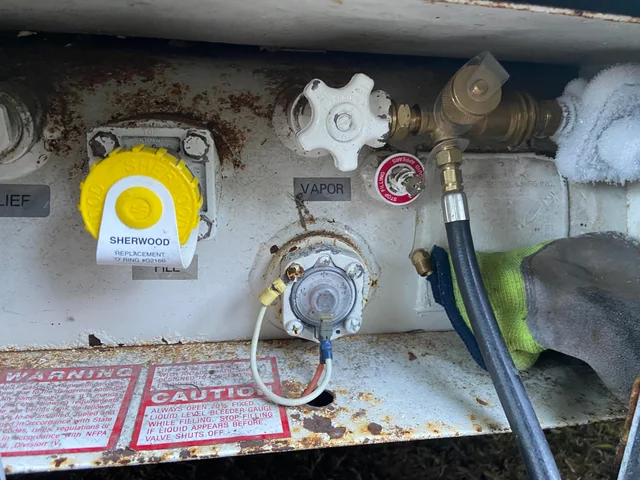Propane gas is typically odorless, but an odorant, like mercaptan, is added to give it a distinct smell. When a propane tank is low, the pressure decreases, causing the liquid propane and the odorant to evaporate more quickly.
Moreover, this makes the smell of propane more pronounced. If you notice the smell of propane in your home. So, it’s essential to take immediate action to ensure everyone’s safety.
Evacuate the premises, ventilate the area by opening windows and doors, and avoid creating sparks. Contact emergency services and your propane supplier for assistance.
Regularly check the tank levels and schedule maintenance for your propane system. It can help prevent low tank levels and reduce the risk of propane leaks.
The Propane Smell in a House

Propane is a colorless and odorless gas. However, an odorant known as ethyl mercaptan is added to propane to help detect gas leaks. This is why propane typically has a “rotten egg” smell, making it easier for individuals to detect a potential leak.
Moreover, propane is odorless in its natural state, but an odorant is added for safety, as leaks can be hazardous. The smell of it in a house usually indicates one of two things: a leak or low tank level. In both cases, it’s important to act quickly to prevent potential hazards.
What to Do When You Smell Propane in the House?
When you smell propane in your house. It’s essential to take immediate action to ensure the safety of everyone in the building. Because it is a highly flammable gas that can pose serious risks.
If it leaks into an enclosed space. Here’s a more expanded guide on what to do when you detect the smell of propane:
Evacuate Immediately
The first step is to evacuate the house immediately. It is heavier than air, so it can collect in low-lying areas, such as basements. If you detect the smell of it, leave the house immediately, ensuring that everyone else in the house, including pets, also evacuates.
Avoid Creating Sparks
As you leave the house, avoid using electrical switches, appliances, or devices, as they could create sparks that may ignite the gas. Also, avoid using your cell phone or any other electronic device that could create a spark.
Ventilate the Area
Once you are outside, open windows and doors to ventilate the area. This will help disperse the propane gas and reduce the risk of an explosion.
Do Not Re-enter the House
Under no circumstances should you re-enter the house until it has been deemed safe by a qualified professional. Even if the smell of propane dissipates, there may still be a dangerous amount of gas present.
Contact Emergency Services
Call 911 or your local emergency number to report the smell of propane. They will dispatch the appropriate emergency personnel to handle the situation. Make sure to give them your address and let them know that you have evacuated the house.
Contact Your Propane Supplier
After you have called emergency services, contact your propane supplier to report the incident. They will be able to send a qualified technician to address any issues with your propane system.
Stay Away from the House
Do not re-enter the house until emergency personnel or a qualified technician has inspected and cleared the area. It’s important to stay at a safe distance from the house until it has been deemed safe to re-enter.
Consider Installing a Propane Gas Detector
Propane gas detectors can provide an additional layer of safety by alerting you to the presence of propane in your home. They can be particularly useful if you are not home when a leak occurs.
Identifying the Source of Propane Smell

Diagnosing the cause of a propane smell in your house requires a methodical approach. Here are the steps you can take.
Check the Propane Tank Level
Starting by checking the level of propane in your tank is the first step. If the tank is low, this could be the reason for the smell. A low propane level may affect the pressure of the gas in the tank.
And how well the odorant can reach the gas outlet. This can result in a more noticeable smell of propane in your house.
Inspect Gas Appliances
Check your gas appliances for any signs of leaks or malfunction. This includes your stove, water heater, furnace, and any other gas-powered appliances you may have.
Look for visible signs of damage, such as cracks or corrosion, and listen for any unusual noises, such as hissing or whistling.
External Factors
Consider any external factors that could be causing the smell. For example, if you recently had your propane tank refilled. And the smell could be due to a spill or leak during the refilling process.
Similarly, if you live in an area prone to earthquakes. A shift in the ground could have caused damage to your propane system.
Preventive Measures for Propane Smell in the House

Ensuring propane safety at home involves regular tank checks to prevent low levels that could lead to a stronger smell. Regular inspections and maintenance of gas appliances, like water heaters, help spot leaks or damage.
So, It’s crucial to teach everyone in the house about the propane smell and safe evacuation. Adding propane gas detectors in key areas adds extra safety.
In addition, regular maintenance of the propane system is key, including tanks, lines, and appliances. If you smell propane, evacuate immediately, and call emergency services and your propane supplier. These steps reduce the risk of leaks, keeping everyone safe.
FAQ’s
Is it normal to smell propane when the tank gets low?
Yes, propane tanks are designed to emit a small propane smell as they get low to alert homeowners or business owners that it’s time for a refill.
What happens if your propane tank gets too low?
An empty or nearly empty propane tank can rust, making leak detection more difficult and increasing the risk of fire or explosion if gas vapor reaches an ignition source. Appliances fueled by propane will not work when the tank is empty.
Final Words
The smell of propane when a tank is low is a safety alert. Propane itself has no smell, but a special odorant is added to it so we can notice if it’s leaking. When the tank is almost empty, the smell becomes stronger because the gas evaporates more easily.
Further, if you smell propane, leave the area right away and open windows to let the gas out. Don’t use switches or phones that could cause sparks. Call for help and wait until it’s safe to go back inside.
Also, regularly checking the tank and appliances can help prevent these problems. Stay safe and take action quickly if you smell propane!
